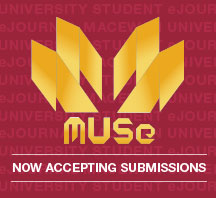Intrusion, Immersive or Irregular: Classifying the Fantasy of Jonathan Strange and Mr. Norrell with the Intertextual Influence of Sir Orfeo
DOI:
https://doi.org/10.31542/muse.v4i1.1848Abstract
Often when we think of fantasy we think of far off places or some magical world completely removed from our own. We think of C.S. Lewis’s Narnia or J.R.R. Tolkien’s Middle Earth. Even J. K. Rowling’s wizards and witches are distinctly divided from and inaccessible to non-magical people. But what happens when this Other Place comes into contact with our world? Susanna Clarke explores this type of contact in her novel Jonathan Strange and Mr. Norrell. Relating the adventures of two magicians in early nineteenth century England, the novel describes what happens when the magic of the Faerie realm interacts with our world or, more specifically, with England. The ultimate effect is one where each place does not exist independently of one another but rather are ontologically connected. Unpacking the particulars of this existential coexistence and identifying the exact nature of Clarke’s fantasy is no easy task. For this it is helpful to turn to Farrah Mendlesohn’s Rhetorics of Fantasy, a book dedicated to the classification of five different types that a fantasy work might fall into: portal-quest, immersive, intrusion, liminal and irregular. Despite the thorough detail that Mendlesohn achieves in outlining and explaining each category, Clarke’s novel remains exceedingly difficult to place. In addition to Mendlesohn’s book then, we must also turn to the outside influence of other primary texts, like the Middle English poem Sir Orfeo, to classify the intricate fantasy that is Jonathan Strange and Mr. Norrell.
References
Downloads
Published
Issue
Section
License
Copyright (c) 2020 Alyssa Kulchisky

This work is licensed under a Creative Commons Attribution-NonCommercial 4.0 International License.
By publishing works in MUSe, authors and creators retain copyright under a Creative Commons Attribution NonCommercial (CC BY-NC) license, which allows others to share these works for non-commercial purposes as long as credit is given. The MUSe Editorial Board reserves the right to make copy-editing changes to works prior to publication to ensure they conform to the publication's style and quality standards. The Editorial Board also reserves the right to archive published submissions in MacEwan University's institutional repository, RO@M.



